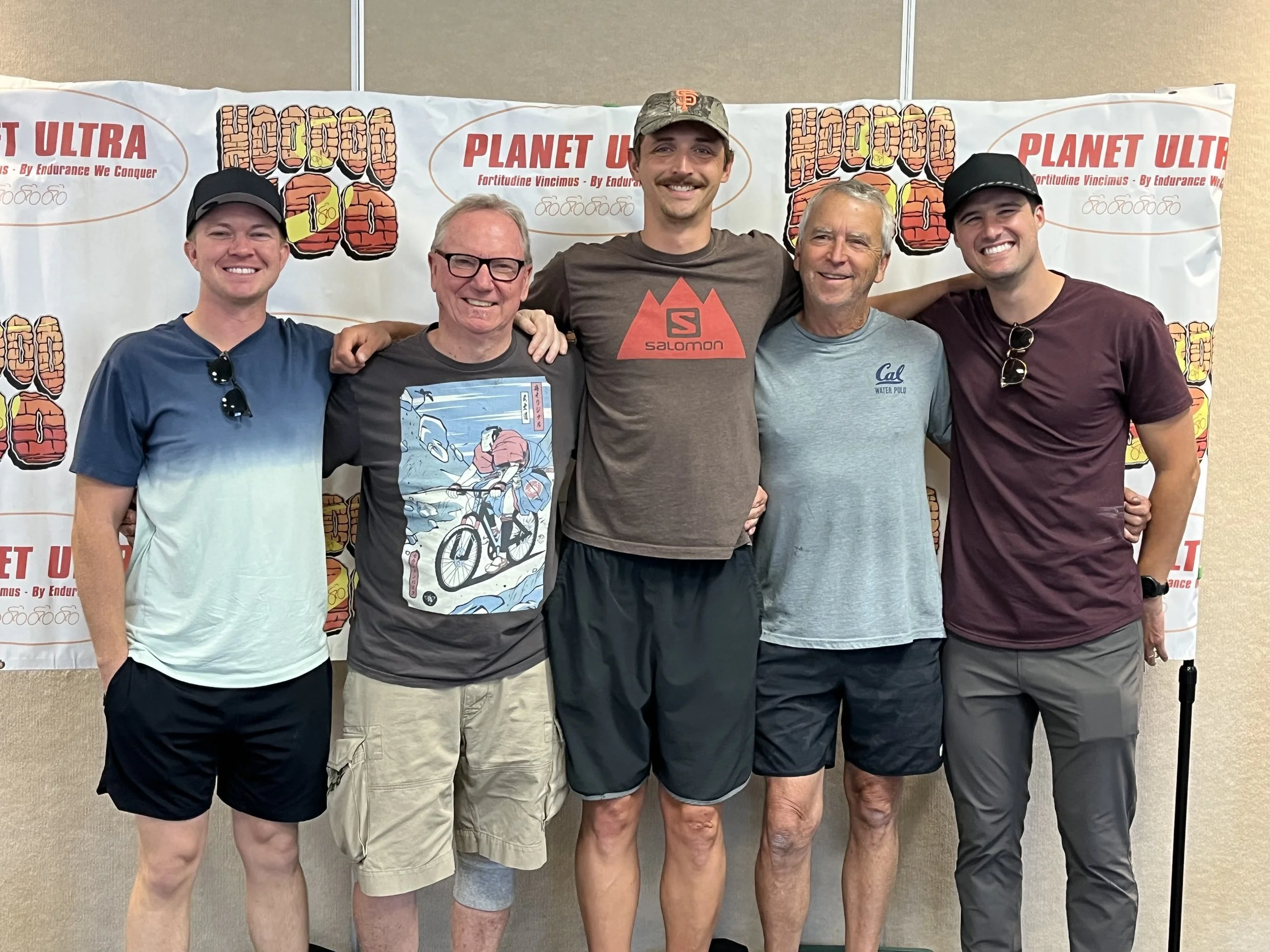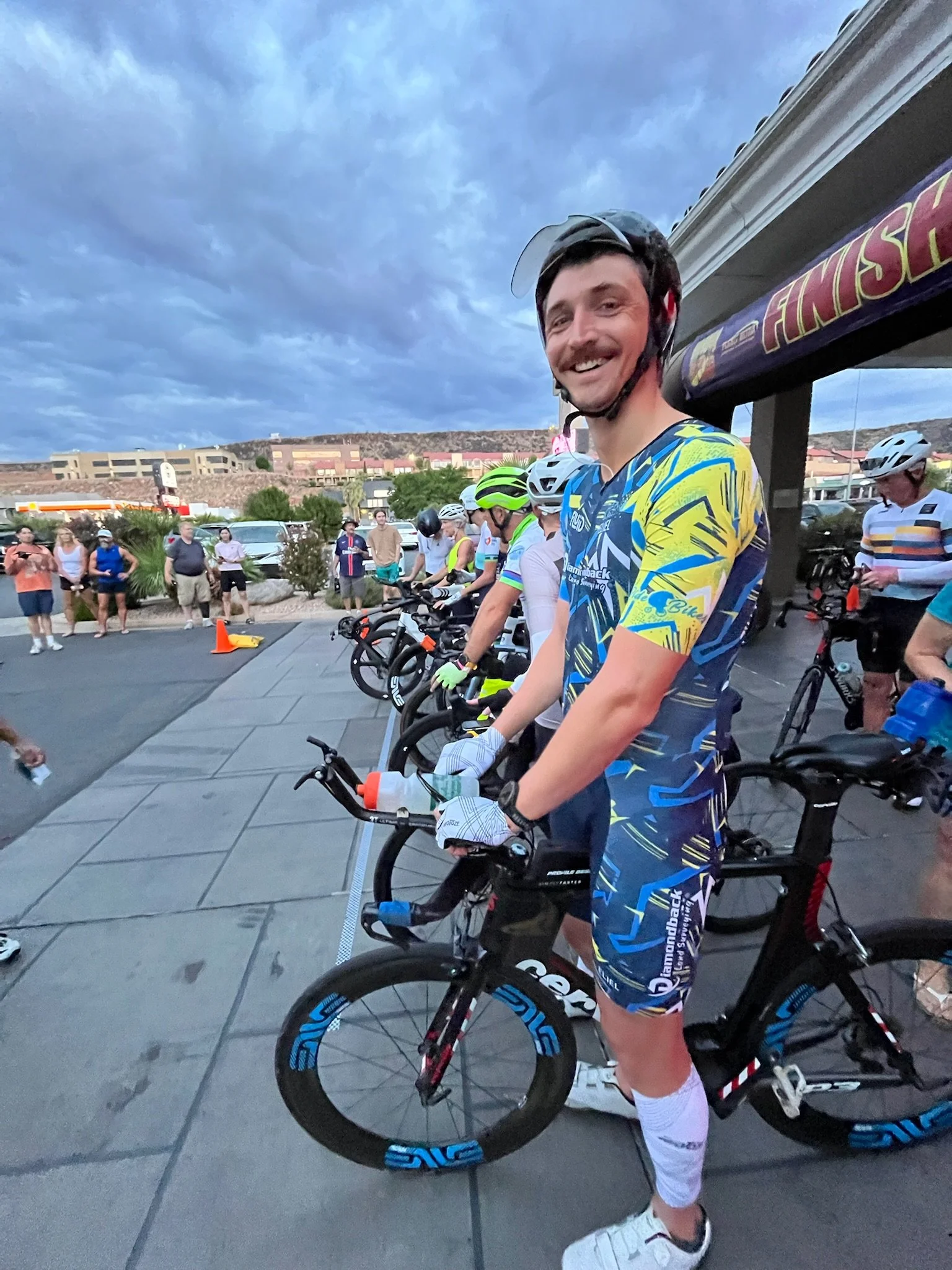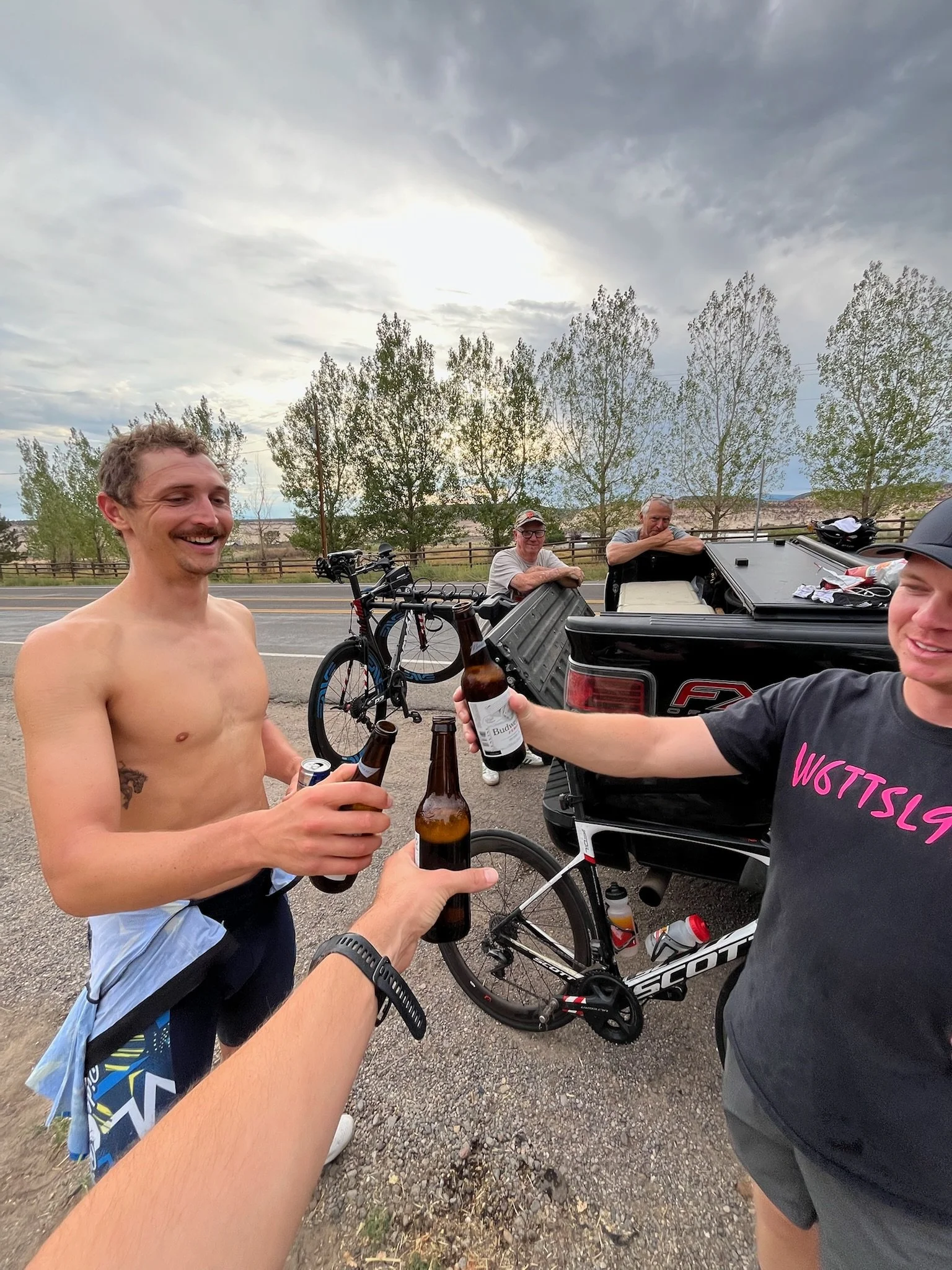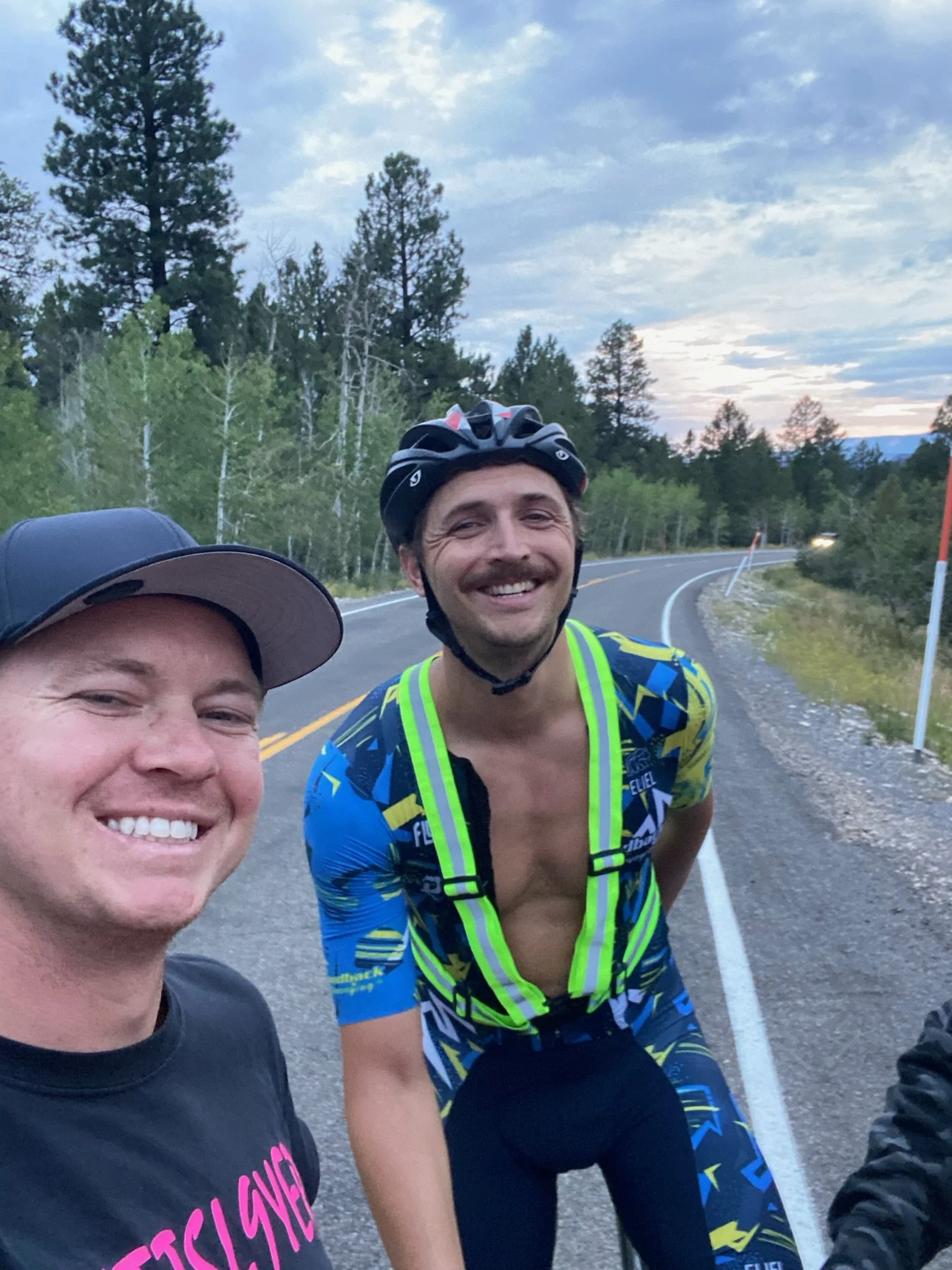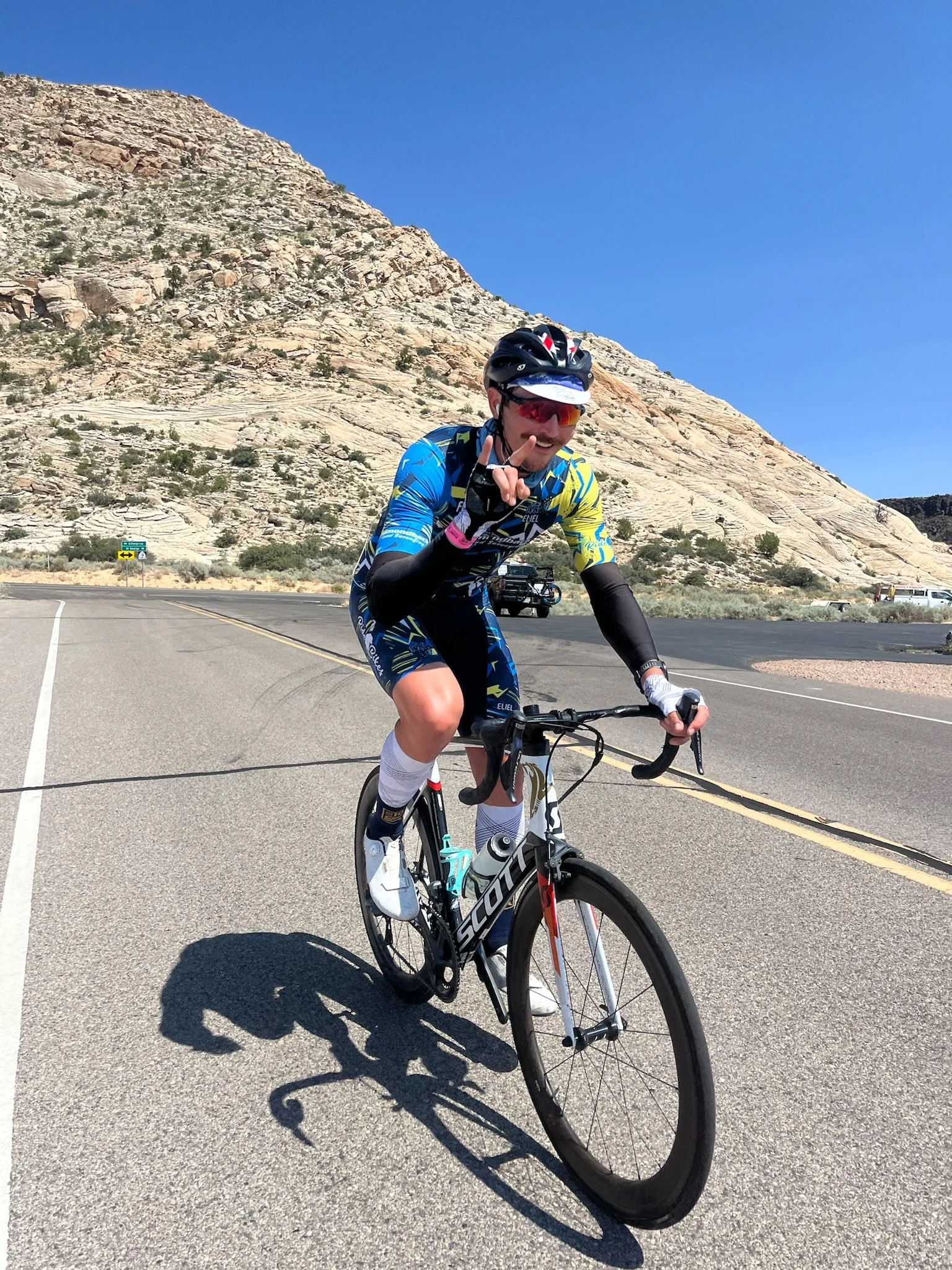Hoodoo 500 Round 2
The “good old days” are always seen in the rear view mirror. And the funny thing about the “good old days” is that they lack the requirement of needing to be good at all. Looking back on events in our lives gives us the knowledge that yes, indeed everything worked out just fine since we are still alive to tell the tale. However, when we are stuck in an unpleasant or uncertain time in our lives, our anxieties surrounding the discontents we have make the current moment less pleasant than how we remember it in hindsight.
An example of this is life in your 20’s. Looking back you had all the options in the world, and the freedom to pursue anything you wanted. If you are now middle-aged and tethered to a mortgage and a stable yet unpleasant job you may find yourself idealizing this time as the “good old days.” However, are you forgetting the crippling anxiety you used to experience about your uncertain future? Or the stress of not knowing if you could make enough money to survive in the “real world” by yourself? We tend to forget these things, and we desire to be placed back in time with rose colored glasses.
As humans we have an innate ability to romanticize the past and catastrophize the present. We idealize our past selves and look forward towards hopes of a brighter future, while at the same time seeking to change everything we can about the current moment. In my opinion, reversing this trend is one of the most important skills to living a fulfilled life, and also excelling in all avenues that you may pursue.
I’ve been thinking a lot lately about how to make time move slower. Living in the present, savoring experiences, and eliminating the desire for anything to be different seems to be a good way to accomplish this. The caveat here is that if we want life to move slower and savor moments, we can’t just do this with the good ones, but rather we must do it with the less desirable ones as well. We cannot pick and choose when we want our perception of time to speed up or slow down. So if we want to slow down our perceived pace of life, we must be present and savor not only the good times, but also the bad.
I came into the Hoodoo 500 with these musings at the top of my mind. If we tend to only remember the highlights after the fact, I wanted to make sure I lived this experience in real time, not just in hindsight. That became the real challenge I set for myself. Although I knew that this race would be one of the hardest things I would do all year, I would look back on it as a positive, formidable experience. Additionally, having my dad and close friends crewing me through the race, and dedicating a ton of their time to help me achieve my goals is an absolutely amazing privilege to have. Letting negative self-talk creep into my head while they were there helping me seemed like a disgrace to the privileged position I was in. On top of this, being able to even toe the line of an event like this requires good health and extreme fitness, two things that I won’t have forever. There will be a time down the road where I have neither, and it would be an insult to my future self if I didn’t appreciate every moment being able to attempt something like this.
The week leading into the race was relaxed. I usually get anxious before an effort this large and important, but not so much this time. I knew it would arrive soon, and I focused on checking all the boxes I needed to before it did. Gear checks, sleep, hydration, nutrition. The worst thing I could do at this point was add stress to my life or try to prove anything to myself before the race. I sometimes fall into this trap, but I avoided it this time.
Leading into race morning the plan was simple; eat and drink as much as possible and try to not get off the bike. I had about 4 hours of stoppage time last year and I knew this was where I could improve upon my previous race the most. I had to be in a hurry, but not too much. My fitness wasn’t much better leading into the race this year, if at all, so I had to win it on the mental side. After a decent night’s sleep I woke up, stuffed my face with as many calories as possible, chugged about a gallon of salt water, and got my bike ready.
At 7am it was already a warm Saturday morning. The riders followed the race organizer for 5 miles on an easy parade start leadout through St. George followed by the starting signal. A few nerves started to set in at this point, but I felt unusually calm and ready for what was ahead. The key here is to not think about the effort in its entirety. If you let it sink in that you’ll be on your bike until the sun goes down, then through the whole night, then well into the next afternoon, the anxiety may overtake you. It’s best to stay present, just like with anything.
The first 80 miles were rolling through southern Utah and into northern Arizona. We passed beautiful red rock formations by Sand Hollow State Park and pink sand dunes in Coral Pink Sand Dunes State Park. I settled into second place and focused on keeping my breathing controlled and my head down. The excitement was getting to me a bit as my heart rate rose a little too high, but I knew this would wear off as the fatigue set in soon.
As I climbed up toward Bryce Canyon at mile 135 the first rain started to come down. This actually pleased me because the alternative was extreme arid heat. I’m not a person who does well in hot conditions, no matter how much I try to be, so the moisture was welcomed. My crew was doing really well motivating me and helping with everything else that I needed. I felt like everything was falling into place as I extended my 2nd place position. I decided to settle in and conserve my energy a bit before the big climb out of Boulder that was looming. Breaking up the race into digestible chunks is crucial here. Eating, drinking, and staying relaxed was the focus for the next 70 miles.
The sun set on day 1 as I climbed up Utah-12 north of Boulder. The air was calm and quiet. All I could hear was the sound of my follow vehicle close behind me and the occasional rumble of an ATV carrying hunters off to stalk elk. Rather than dreading the night ahead I felt a deep appreciation for what I had already accomplished that day. What a cool privilege I have to ride my bike all day through southern Utah, and see the sunset on this mountain in the middle of nowhere. Few people get to experience something this amazing, and I recognized that. I made my way up the climb and bombed down the other side to the town of Torrey. I was tired. I needed a quick break.
It’s an odd feeling shopping in a gas station at night when you have been toiling through the dark for so long. The bright lights feel like a bit of a shock. Seeing people buying beer and living their lives on a normal Saturday night makes you remember the world doesn’t revolve around you. I think this is good to remember. I tried not to linger too much as I was still less than halfway done. I quickly ate a philly cheese steak sandwich (this actually helped settle my stomach, surprisingly), made one more emergency bathroom break, and set off into the quiet darkness.
From Torrey it was 110 miles to the next major stop in Panguitch. That means about 6 hours of biking through the night. I knew at this point I was on borrowed time and the only thing pushing me forward would be continuous eating and sheer stubbornness. My headphones had stopped working so it was a quiet stretch as I basically was able to listen to nothing except the wind over my ears. I stared blankly up the road, only paying attention enough to avoid potholes and stay upright. A couple suicidal bunnies almost threw a wrench in this plan, as I narrowly missed crushing one or two. I’ll take the brief adrenaline rush. Small hallucinations started here too. Nothing major, just visions of animals and creatures moving as the following vehicle headlights glided over rocks and bushes.
Riding through the middle of nowhere at night reminds you of how insignificant you are, and realistically how meaningless what you are doing is. Well, not completely meaningless. I don’t mean meaningless in a nihilistic way, but rather as a way to put this into perspective for myself. Undertaking something like this can inspire those around me positively, which I don’t take for granted. Additionally, completing what I started is fundamental for building the man who I want to be, and passing that on to others is a net positive for society. I mean “meaningless” as a good reminder that any pain, discomfort, or boredom I’m feeling doesn’t matter to anyone but me in this moment. The people driving by me don’t care, the people back in St. George don’t care, people out in other countries of the world don’t care, even I won’t care once this is over. These transient perceptions don’t matter, and I shouldn’t build them up to be all-encompassing and let them determine my outlook. Once this is all over it’ll be just that; over. And the only thing that will matter is how I carried myself.
I love the quote, “with desire comes discontent.” Eliminating desire to change any aspect of your current situation is fundamental to being happy in that moment. If you wish to be somewhere else, with someone else, or have something else, you inherently depreciate your current circumstances. At this point in the race it’s easy to wish I were further along than I was. The closer you get to a big benchmark the more the craving sets in. It’s better to not know how far you have left. As I rode quietly through the night I approached a turn and my dad said, “40 miles to Panguitch.” Once I heard this it was all I could think about, and it wreaked havoc on my mentality. The mileage countdown consumed me; 39…38…37… “If only I were in Panguitch by now I’d be happy.” I knew when I arrived in Panguitch I could change bikes, reset my mentality, and look forward to sunrise. But until then my mind had trouble accepting that I still had a couple hours of dark, cold riding to go. It took all I had to bring myself back to the present and enjoy where I was, who I was with, and how much left I had to go. Clearly I didn’t deserve to be further up the road, otherwise I’d be there. Appreciate where you are at this moment, it’ll all be over soon, and you might even look back on it fondly.
I rolled into Panguitch at around 4am. The plan was to do a quick body check-in, change bikes, and be on my way. As beat up as I was, I was feeling better than anticipated at this point, which left me optimistic. I made a quick restroom stop, blew my nose, clogged the blood that started flowing from it, chugged a Red Bull, and went on my way. 150 miles to go.
As much as I love climbing on my bike, I’m not a climber at the moment. I weigh 205 pounds (40 pounds more than most cyclists) and have thickened up a bit in the last few years as I’ve discovered a love for lifting weights and having a body that is not unnaturally thin. Yes, this is a controversial move in the cycling community as it makes you a bit slower, but I’ll defend it. The reason I say this is there is a 4,000 foot climb out of Panguitch. I knew it would take me about 3 hours and send me up to an altitude of 10,500ft. After 365 miles I see this as a sick joke thrown at us by the race organizers. Once you crest this climb you have physically tackled all the hardest parts of the course, but it’ll cost you.
As I creep toward my physical limitations that my genes have given me, I’ve started to focus way more on my mental and emotional capacity. I believe that your mentality and intestinal fortitude have fewer hard limits than your physical ones, and in ultra-endurance sports they tend to weigh more heavily than in shorter events that are more dominated by the genetically superior. As hard as it is to admit, I have always had an attitude problem. When I take pride in something and things are not going my way, I can be my own worst enemy. I talk down on myself, I beat myself up, I tell myself to quit. Everyone experiences this to some degree, but from the start of my endurance sports endeavors 15 years ago I have always considered myself mentally soft. This trait can be a driver of success, as never being happy with where you are can be used as fuel for pushing forward stubbornly. However, it’s not a sustainable way to pursue your passion. I’ve recognized this over the years, and have emphasized it way more recently as I have dipped my toe into ultras. To be successful in this sport you must get good at being happy even when there is nothing to be particularly happy about. If you can do this in cycling and in life, you’re going to have a good time.
As the climb out of Panguitch to Cedar Breaks loomed, I had every reason to be pessimistic. And last year I was. I moped and complained when things got tough. Even though I kept pushing forward I looked and sounded awful while doing it, and I was ashamed of it. This year one of my only goals was to stay present the whole race, and I forced myself to do this now. I cracked a few jokes in the parking lot at the bottom of the climb and tried to downplay the effort in front of me. I already knew I would finish this climb in a few hours and nothing would change that. So if I knew I would get it done, I might as well joke around and make it look easy, rather than complaining the whole time. Nobody likes a moper and a complainer. There are some problems you need to just keep to yourself and not put on other people. If you’re going to do it, make it look easy.
As I approached the halfway point of the climb around 5am I felt surprisingly optimistic. I felt comfortable on my bike and my legs were ticking at a nice rhythm. I started to see slight color differentiation between the sky and the mountains as dawn crept up on us. I arrived at Panguitch lake much earlier than last year, and was encouraged to know I was ahead of my previous time. The altitude started getting to me as I closed in on 10,000 feet of elevation. Coming from the Bay Area two days earlier and climbing up this high was taking its toll. The air felt thin and I started to get light headed. I had gone very deep physically, and my body was starting to reject high effort. I hopped off the bike to center myself for a minute before finishing the climb at Cedar Breaks. Finishing this stretch at sunrise is an amazing feeling. I remember saying to myself that although I was in a lot of pain and I was quite tired, there was nowhere else I would choose to be at this moment.
The descent to Parowan is fast, cold, and really dangerous when you are sleep deprived. I got down it without incident but my back and shoulders were paying the price. In Parowan I had “only” 100 miles to go, which is a crazy statement. This is where I lost my race last year. I thought the last 100 would be easy so I let up mentally. The terrain in the last 100 isn’t too bad, but it can be hot and windy. I only “raced” 420 miles last year, and I considered the last 100 to be a failure. I was intent on racing all 520 this year, so I chugged a Red Bull, switched bikes, and pressed on forward.
As nice as it is to have the sun back up, I actually hate riding on the second day more than anything. It gets hot and windy again and traffic picks up. I wish I were faster so I could finish before all this happens but unfortunately I’m not. Focus has to shift back towards hydration and cooling. The temperatures will rise 50 degrees over the last 6 hours, and in the past I had been in too much of a rush and forgot to shed my cold weather gear. I made a point to remember to execute these last 100 miles by drinking more, stripping clothing, and reapplying sunscreen. My crew was also amazing in forcing me to do all these things when my brain was shutting down.
My mental fortitude was seeming to hold up, but stops became more frequent as fatigue set in. I only stopped 20 minutes in the first 200 miles, and in the last 100 I was off the bike for about 23 minutes. Nevertheless, I maintained a bit of urgency to get through this last stretch as quickly as possible, and I didn’t let a negative word out of my mouth to my crew (that I remember). As I rolled through Enterprise around mile 460 sitting became unbearable due to extreme chafe and saddle sores. My legs felt good except for an extreme ache and slight swelling in both my kneecaps, and my traps and neck had the usual radiating nerve pain that would shock me every few minutes. Even though it sounds a little unpleasant, I was still nowhere near as distressed as I have been in races past.
“It can always be worse” is a mantra I like to replay in my head in times like these. I like to think of things that could create even more discomfort for me, and remind myself that I would still probably push on in spite of them. Let’s say that instead of 520 miles this race was 550. I would probably still finish, right? So what if this hypothetical 550-mile race was suddenly shortened to 520, I’d be pretty ecstatic about it! So when looking at the miles I had left, I should be able to recognize that things right now could be worse, and I should look at my circumstances objectively and tackle them as such. I started thinking of other things that could make this experience worse, and be thankful that they weren’t occurring. More heat, more wind, more fatigue. These would all make my day even more unpleasant. Then if I’m really scraping the bottom of the barrel for a boost in mood I can think to my regular life outside of this race:
-I have my health.
-I have a job I like and a means of keeping a roof over my head when I go back home.
-I have a family that loves me and is even helping me get through this race.
Thinking of all these things reminds me to stay positive and not catastrophize tough situations, because life is good. Or at least it can be a LOT worse.
These thoughts kept me focused for the last few miles leading into Snow Canyon State Park. I finally made it to mile 510 knowing the last miles were mostly downhill. I knew all the hardest riding was done, and I became slightly emotional thinking about what I overcame in the last 31 hours and how proud I was of the effort. I quickly met my crew, we snapped a picture, I dumped some water on myself, and began the final descent.
As I rolled into St. George the heat started getting to me again. It was now about 95-degrees and my mind knew I was almost done, so it started shutting down. I only had about 5 miles to go but I felt wobbly and uneasy. I rode by a golf course and almost jumped into the water hazard, the only thing stopping me was the duck poop I noticed floating in it. Leading up to the race I had imagined riding these last few miles in celebration, excited about what I had accomplished. Instead I slogged down the false flat downhill barely pedaling my bike, hyperventilating and focusing on not toppling over. I called my crew and warned them that I was barely holding it together, and when I crossed the finish line I needed immediate hydration and cooling. I crested the last little climb as I pissed myself because I couldn’t focus on keeping it in. I dumped hot water from my bottles over my body in an attempt to clean up a bit as I approached the finish. I rolled into the chute at about 31 hours and 45 minutes, 90 minutes faster than last year.
I expected to cross the finish line of this race in ecstasy. At the very least with a feeling of intense relief. Unfortunately this wasn’t what I experienced. My first feeling was one of worry, that I needed to immediately hydrate and cool myself before I passed out or dealt with more serious consequences. The second was a feeling of… well, to be honest I didn’t really have any other feelings at that moment. I was so exhausted and broken that the last day and a half felt like a fever dream. It was now over, and it was time to eat, sleep, and go home. I’m writing this about a week after finishing, and I decided to do so in an attempt to wrap my head around such an important experience for me.
Giant athletic achievements used to hit me like a drug, and that’s why I kept coming back. The feeling of finishing a huge effort felt like nothing else in the world. But over the years I think I have placed more emphasis on other aspects of my life, and rely less on these big accomplishments for a sense of self. Additionally, I think I see them for what they are; transient. You train for something, you complete the event, you do well or you don’t, and you move on. Once it’s over it’s over, and realistically it doesn’t matter. That’s not to say I don’t have a deep sense of satisfaction for what I accomplished, because I certainly do. But rather, I think I’ve been more focused on what matters after the dust clears. What’s left when the race is over and you go back home to your normal life? This is more important to me now than smashing myself relentlessly in a race.
If you made it this far you’re a champ, and I appreciate you. This race, writing this blog, and just life in general has been a lot. It feels good to put my thoughts on paper, and to explore these topics, and if you found it entertaining then I’m happy. I’m sure there will be another one sometime down the road, and until then, happy trails.
Here are some stats from the ride:
-Miles Ridden: 516
-Average Speed: 17.9mph
-Elevation Gain: 29,485ft.
-Peak Elevation: 10,360ft.
-Total Time: 31:45:38
-Ride time: 28:49:44
-Stopped time: 2:55:54
-Average Power: ∽ 200-210w
-Calories Burned: ∼21,000
-Calories Consumed: Not enough

